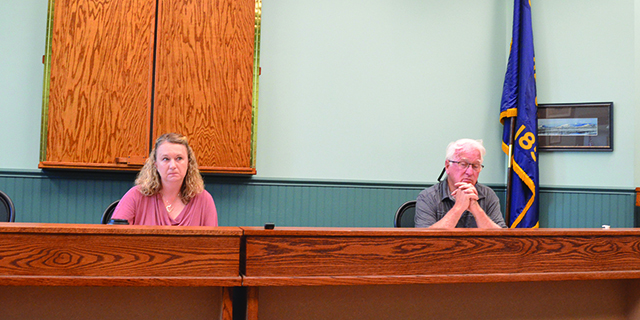Where supporters, opponents differ on Measure 110
Published 5:00 am Wednesday, October 28, 2020
Despite the vigorous debate about Measure 110 on the Nov. 3 ballot, supporters and opponents do agree on a couple of main points.
They agree that treatment and recovery are preferable to arrest and imprisonment for drug users. They agree that more money should be available for expanded services.
But they disagree about whether Measure 110 moves Oregon toward those goals.
The proposed law would greatly reduce the penalties for possession of small amounts of illegal drugs. Instead of potential maximum fines between $1,250 and $6,250 — and maximum jail time between 30 days and one year — the law would make possession a new violation comparable to a traffic ticket and punishable by a fine of $100. That fine would be waived if the offender completes a health assessment at a regional center.
The specified amounts under Measure 110 are: Cocaine, two grams; heroin, one gram; LSD, 40 tabs; methamphetamine, two grams; methadone, 40 doses; MDMA, known as “ecstasy,” one gram or five pills; psilocybin mushrooms, 12 grams; oxycodone, less than 40 pills.
Although penalties would be unchanged for possession of larger amounts, and possession for sale or distribution, Measure 110 would make Oregon the first state to decriminalize these drugs.
Oregon legalized marijuana for recreational use in 2014, two years after Colorado and Washington, and Measure 110 does not change its status.
However, the proposed law would redirect the spending of millions that Oregon now collects in marijuana taxes, which are 17% of the retail price.
Instead of the 80% of tax proceeds that now go to public schools, State Police and current mental health and addiction treatment programs under the 2014 measure, the money would go into a new fund to pay for addiction recovery centers in the 16 areas Oregon has designated for coordinated-care organizations. Those groups provide services to the 1.2 million low-income recipients under the Oregon Health Plan.
State officials estimate that Measure 110 could result in a shift of more than $100 million in the state’s 2021-23 budget cycle, although it specifies that a total of $11.25 million per quarter must be maintained for existing recipients.
Supporters have raised $3.3 million and spent $3 million as of Oct. 25. Virtually all of it has come from just a few out-of-state sources. Drug Policy Action, the political arm of Drug Policy Alliance based in New York, has given $2.2 million excluding noncash contributions. Other big donors are the Chan Zuckerberg Initiative, established by Facebook founder Mark Zuckerberg and his wife Chan, $500,000; the Sixteen Thirty Fund, which gives to liberal causes, $250,000, and the national American Civil Liberties Union, $150,000.
Supporters have amassed a long list of organizational and individual endorsers, among them Ed Jones, retired chief criminal judge on the Multnomah County Circuit Court.
Opponents have raised just under $100,000 and spent about $75,000. In addition to 25 of Oregon’s 36 district attorneys, plus the associations of sheriffs and police chiefs, some treatment providers oppose the measure.
Two of the three chief petitioners for Measure 110 are Anthony Johnson, who also served in that role for Oregon’s 2014 marijuana legalization measure, and Janie Gullickson, executive director of the Mental Health and Addiction Association of Oregon.
According to a September 2019 report by the Oregon Criminal Justice Commission, Oregon ranked third nationally in 2017 in unmet needs for drug and alcohol treatment — and first in use of marijuana and misuse of pain relievers, second for methamphetamine use, fourth for cocaine use, and fourth for alcohol and substance use disorders.
“We need to change to a health-based approach because people suffering from addiction need treatment and recovery services, not criminal punishment,” Johnson said. “In the end it will save lives and taxpayer dollars, and better allocate our limited resources.”
Like many leaders of recovery programs, Gullickson said she has personal experience with the failings of the current system.
“The trajectory of my life would have been very different” if Measure 110 had been in place, she said. “If I had been given the opportunity to consider it a health care issue — not a moral failing or a personal character defect that was criminal or shameful — I would have been able to reach out and get the services I needed.”
Another analysis by the Criminal Justice Commission, which for the first time weighed in with a racial impact statement on a ballot measure, Measure 110 would reduce criminal convictions for possession of a controlled substance by 90%, from 4,057 in 2019 to a projected 378. Slightly more than 80% of those convicted in 2019 were white, and that share would be about the same under Measure 110. About half the convictions were misdemeanors, and half felonies; repeat offenses lead to increased penalties.
Johnson said he is under no illusions that redirecting $100 million in marijuana taxes will pay for what Oregon needs for adequate treatment services.
“But we’re going to empower local communities to address addiction services to what they need,” he said.
The measure will divert marijuana taxes now going to law enforcement and drug treatment programs, some of whose leaders have called for a broader effort to increase state beer and wine taxes to raise more money.
As an internal medicine and addiction specialist at Oregon Health & Science University, and a clinician for the Old Town Clinic run by Central City Concern, Dr. Andy Seaman said he understands why there is a difference of opinion among providers. But he also said he thinks most have come down on the side of change.
“There are a good proportion who support, or do not support, this measure based on decriminalization,” Seaman said. “But in practical terms, it will decrease their referral sources and it will disrupt some of the work they have done to build these complex relationships with law enforcement, which I say should not have happened to begin with.”
“I would say in six months, we will be better off.”
Johnson defended the large amount of out-of-state contributions, which also occurred with Oregon’s 2014 marijuana legalization campaign.
“We are proud to have their support. But they do not dictate this campaign,” he said.
“Ultimately Oregonians will vote on the measure because it is the best policy for Oregon — and the current system has failed.”
Con: Wrong direction
Two former officials divided on Oregon’s death penalty — former Gov. John Kitzhaber and former Clatsop County District Attorney Josh Marquis — are united in their opposition to Measure 110.
Kitzhaber wrote Oct. 19 on his blog, where the former emergency-room physician weighs in on public health and other issues:
“I understand that a central motivation behind this ballot measure is to help reverse the disaster caused by the War on Drugs, which incarcerated people suffering from addiction and had a disproportionate impact on Black and Indigenous people and other communities of color.
“I agree with this goal. But Measure 110, as written, makes it more difficult to treat the underlying addiction that leads to drug use in the first place.”
While they were still in office, Kitzhaber opposed marijuana legalization and Marquis was outspoken against the 2014 measure. Marquis said he is more concerned about Measure 110, which would send the wrong message to the public about drugs such as heroin and methamphetamine that cannot be considered “recreational.”
“When you create a climate that does not call for enforcement of existing laws, nothing happens,” Marquis said in an interview.
As a prosecutor for more than 36 years, 24 of them as Clatsop County DA until 2019, Marquis said Measure 110 supporters exaggerate the current extent of prosecutions for drug possession. He said agencies stopped going after street-level offenders years ago, unless they are arrested on more serious crimes. State sentencing guidelines, which date back 30 years, stop far short of maximum fines and jail terms under state law — and the Legislature itself reduced many possession penalties from felonies to misdemeanors in 2017.
“This is a solution to a problem that does not exist,” he said. “But I think we can agree that we have a severe drug problem — and unfortunately, it is getting much worse,” he said in reference to Oregon’s national rankings for drug abuse.
He is among the critics, including some providers, who say that health assessments through regional recovery centers are not equal to treatment for drug addiction. He likened it to initial consultations with a dentist or financial planner, who advise people about their needs, but actual services will cost them money — and Measure 110 does not do that.
“It robs from the existing marijuana fund,” he said, including current allocations to law enforcement and drug treatment programs.
The statewide coalition Oregon Recovers opposes Measure 110, although some providers are among the many endorsing it.
“Decriminalization of addiction, not just drugs, is hugely important,” Se-Ah-Dom Edmo, a co-chair of the coalition, said in a statement. “But how you implement decriminalization is equally important. Measure 110 was written by political consultants and lawyers, not the leading addiction recovery stakeholders in the state. It will not end Oregon’s addiction crisis and, in fact, may make it worse.”
Marquis said voters should be concerned about the millions in out-of-state money behind the campaign, particularly from Drug Policy Action, the political arm of Drug Policy Alliance, a national group whose goal is to change drug laws. Investor and philanthropist George Soros, a liberal, sits on the alliance board, but Marquis said libertarian-leaning Charles and David Koch also support that goal.
“The common mythology is that this is a Democratic/Republican, left/right issue,” he said. “It is not.”






